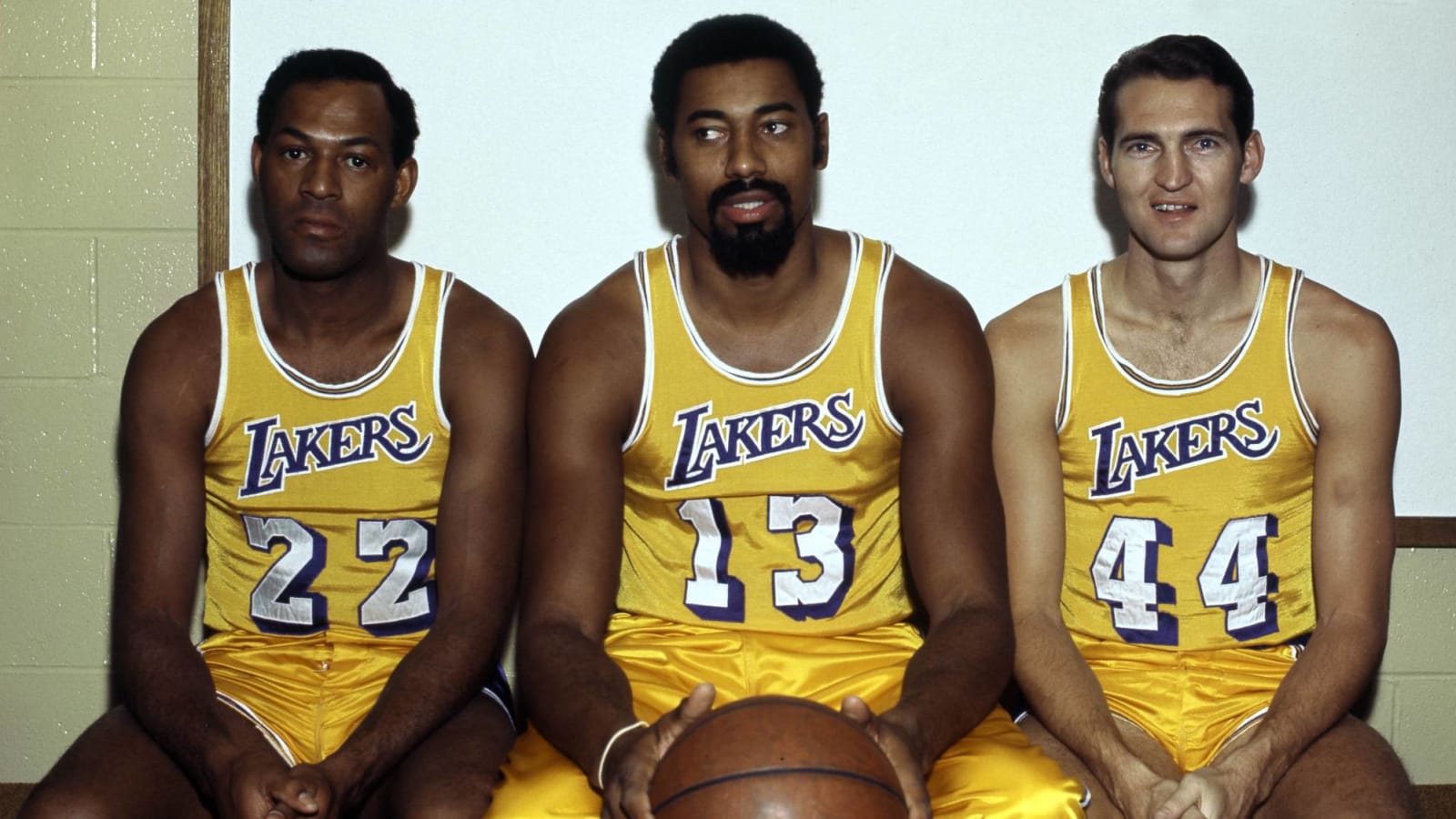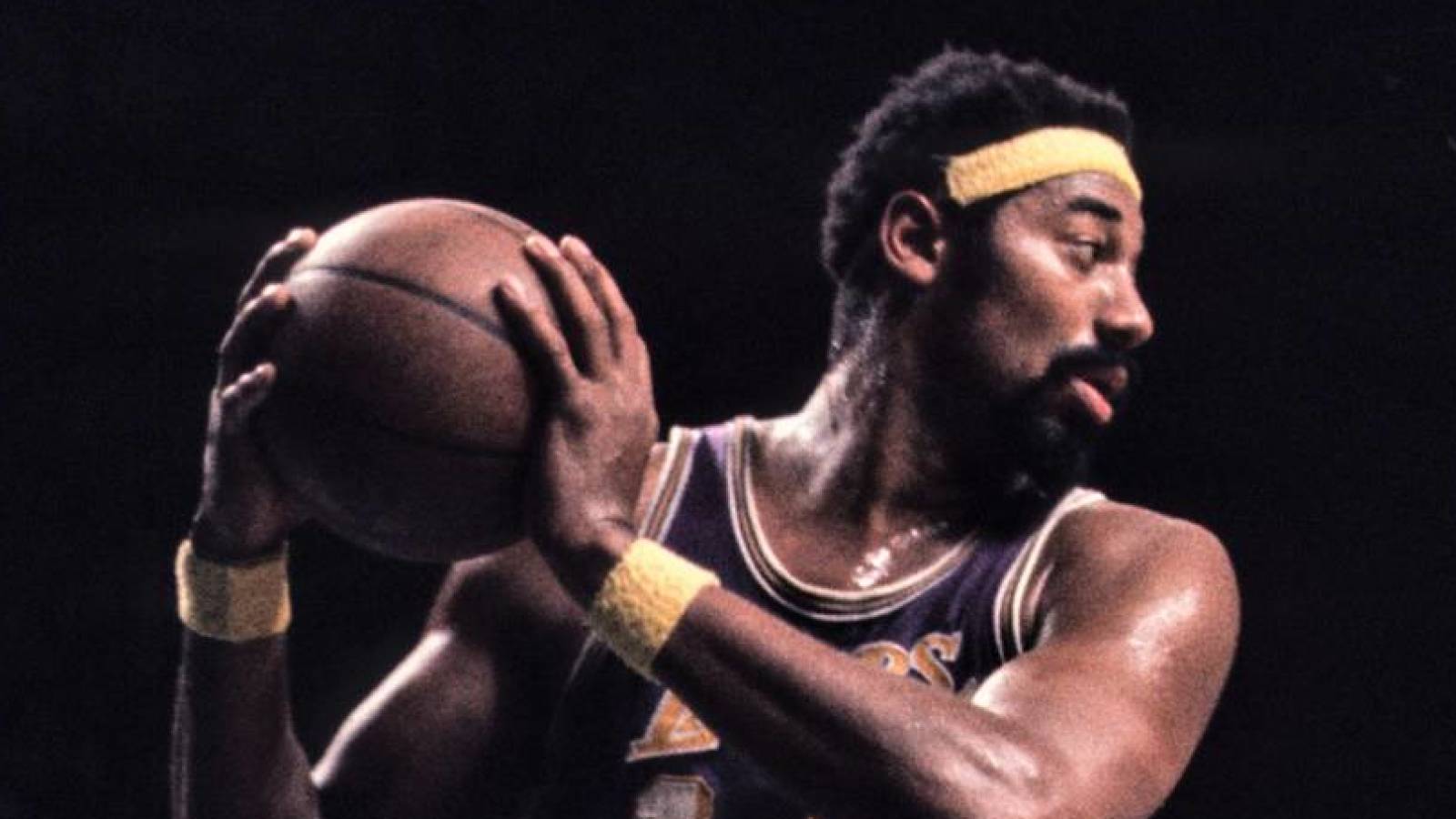
'Difficult to handle? Ridiculous': How Chamberlain, Lakers formed Superteam
Decades before the concept of an NBA Superteam became a thing, the trend-setting Los Angeles Lakers created their own version of a “Big Three.”
On July 9, 1968, Los Angeles shipped center Darrall Imhoff, forward Jerry Chambers and guard Archie Clark to the Philadelphia 76ers for 7-foot-1 center Wilt Chamberlain, who was (in)famous for scoring off the court as well as on it. (20,000, really?)
The Lakers figured the addition of the 31-year-old reigning MVP to a lineup that featured fellow future Hall of Famers Jerry West and Elgin Baylor would result in their first title since moving to Los Angeles from Minneapolis before the 1961 season. West, 30, and Baylor, 33, shot lights-out in 1967-68, averaging 26.3 and 26 points, respectively.
Chamberlain wasn’t the same player then as he was in 1961-62, when he averaged an NBA-record 50.4 points, but he had earned the league's MVP Award the three previous seasons. In 1967-68, Wilt committed to shooting less, but his main stats line was stellar (24.3 ppg., 23.8 rpg and 8.6 apg.).
Hey, maybe the Lakers could go 82-0 with their Big Three!
“Instant World championship, right? Ten years of happy dunk shots, eh? We win 80 games a year, OK? Just mail us the pennant …,” wrote venerated Los Angeles Times sports columnist Jim Murray about the Chamberlain trade. “Shall we play the games or just nominate the Lakers champion by acclamation?”
He was kidding.

Wilt, who could be a handful to coach, came with a little baggage. In the ’67-68 Eastern Division Finals against Philadelphia, the Bill Russell-led Celtics became the first NBA team to overcome a 3-1 deficit in a playoff series. In a 100-96 loss in Game 7 in Philly, Chamberlain snagged 34 rebounds — how insane is that? — but he took only one shot in the second half and finished with 14 points.
“Somehow it doesn’t seem possible,” wrote Pete Cafone of the Camden (N.J.) Courier Post, “that the greatest scorer in the history of basketball could take only one shot in an entire half in the most important game of the year.”
Chamberlain pointed fingers at Alex Hannum, the Sixers' coach. “I can’t do what I’m not told to do,” he told reporters afterward. “The plays weren’t for me.”
Said Hannum: “I’ve never told him not to shoot the ball.”
After the season, Hannum left Philadelphia to coach the Oakland Oaks in the American Basketball Association. Chamberlain offered to serve as 76ers player-coach if Jack Ramsay, then general manager, helped with X’s and O’s and organized practices. Ramsay agreed, but Chamberlain reneged and demanded a trade to the Lakers. The SuperSonics also were interested in acquiring "The Big Dipper," and the ABA reportedly “was ready to stake its very existence with an unbelievable inducement” for Chamberlain.
Perhaps Wilt’s sudden trade demand was what Ramsay called decades later the “enigmatic side” of Chamberlain. But there were undeniable attractions for him with a trade to L.A. — the Lakers were defending Western Division champs; Los Angeles’ weather beat Philly’s almost anytime; and there were numerous, ah, off-the-court opportunities.
Word of the trade seeped out beforehand, but Chamberlain didn’t offer specifics of his Lakers contract. However, the big fella insisted, it was huge — just like his outsized personality.
“It’s for plenty of bucks, baby, plenty of bucks,” Chamberlain said. “It’s so fantastic it doesn’t seem possible. … this is the best contract anybody has ever had in sports.”
Two days after the deal went down, the Lakers held a news conference in Los Angeles with Chamberlain, fresh from working in New York on Republican Richard Nixon’s presidential campaign. The "fantastic" contract was reportedly for five years and $1 million.
The scene at The Forum in Inglewood that morning was straight out of Hollywood: TV cameras, a speaker stand set up beneath a basket and most of the Lakers players and coach Butch van Breda Kolff flanking owner Jack Kent Cooke and Chamberlain, who looked fabulous in a pinstripe electric blue suit with a handkerchief and a matching diamond-blue tie. Baylor was there, but West was out of town.
Pals and hangers-on congratulated Cooke for becoming, in the words of a Philadelphia sports columnist, "the first man to win a National Basketball Association championship in July."
Chamberlain praised Baylor and West and, in shades of LeBron 2010 with the Heat, predicted a dynasty for the Lakers. “… next season,” he said, according the Los Angeles Times, “this team may go down in the record books as the best basketball team ever.”
Cooke had no doubts "The Big Dipper" would be a great fit. "Difficult to handle? Ridiculous," the 65-year-old multimillionaire said of his new star. "He's no more difficult than Elgin."
At least one player at The Forum had his doubts: Imhoff, who, although he was traded, still held down a gig selling season tickets for the Lakers. "...I don't know if you can have happiness," he said, "with three superstars on one team."
Well, the three superstars did OK. Chamberlain, Baylor and West were named to the West's All-Star team that season. But like LeBron in his first year with the Heat, Chamberlain and the Lakers, who were 55-27 in the regular season, didn't deliver an "instant world championship." In the NBA Finals, Los Angeles lost to Boston in seven games.
Chamberlain — the "Creature That Ate the NBA," according to columnist Murray — and the Lakers finally won their elusive NBA title in 1972.
More must-reads:
- Wanna play with these dudes? How 'Delete Eight' can nail offseason
- Wild-card factors bubbling to surface before NBA restart
- The 'Most points in a playoff game by team' quiz
Breaking News
Customize Your Newsletter
 +
+
Get the latest news and rumors, customized to your favorite sports and teams. Emailed daily. Always free!

